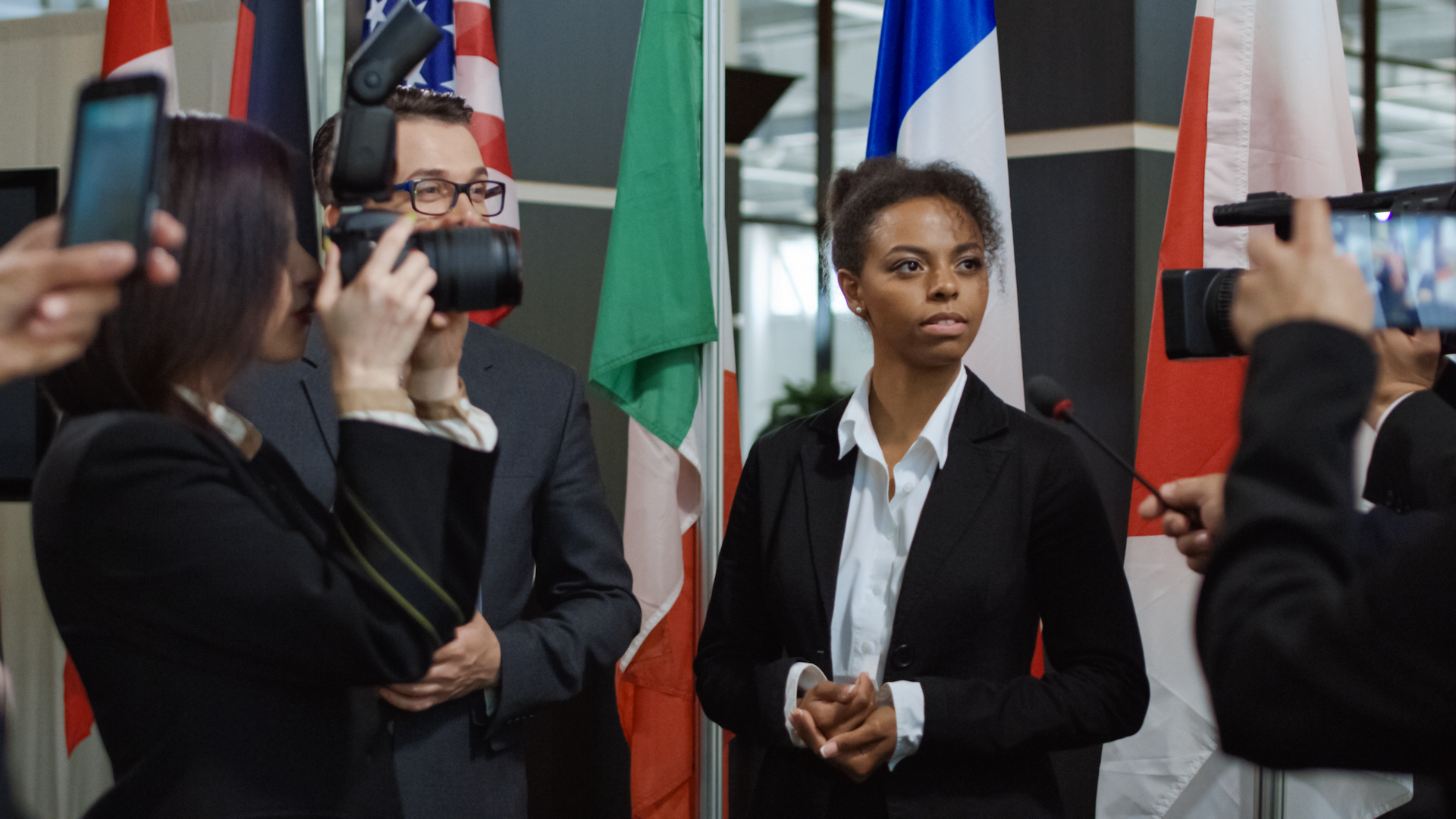The Importance of the Female Perspective

As many nations across the world strive towards democratic development, the gap between the number of male and female politicians continues to plague the globe. Out of 193 countries, just 22 have a female head of state and countries that boast equality in their national cabinet is limited to 13 (Vogelstein & Bro, 2021). In many nations, these dismal statistics have led to a lack of diversity regarding which perspectives are being taken into account on domestic issues, as well as on other concerns salient in today’s international community.
The historical deficit of gender-equitable representation in executive, legislative, and judicial offices has caused laws and regulations to be developed that are devoid of essential gender considerations. Furthermore, patriarchal narratives have been ingrained in many societies for so long that overcoming the default male-centric way of thinking will take extreme reform efforts. This patriarchal orientation certainly exists in the minds of many women around the world, yet it is important not to overlook the reality that many men have more progressive mindsets, so a successful feminist reformation necessitates the involvement of people of all gender definitions.
One important distinction to make when discussing matters of gender inclusion is the need to transcend the narrative of binary male or female identities. As the world moves towards an environment which is more accepting of the lived experience of female oppression, we also must acknowledge the emergence of new perspectives. Non-binary, transgender, intersex, and many other categories of gender identities have only recently been brought into the public vocabulary, after being ignored for so long. Even so, these populations highlight the lack of elasticity in these governing bodies, facing not only discrimination and oppression, but rejection altogether of their existence in some cases. As we fight to bring new perspectives into the written laws in the world, there is an obligation to bring these oppressed and marginalized groups into the conversation – and into decision-making. Without their inclusion, we will face the same dilemma we are now presented with, in the burden of so many outdated laws and lack of equitable representation. Working to reform any system without full inclusion is counterproductive, and morally indefensible.
Among the areas in need of urgent gender-related reform is the field of International Humanitarian Law. While many countries lack equal gender representation in government, the international stage suffers from the same problem, especially in international justice proceedings. Inclusivity of gender specific language in areas of international litigation has been a slow-moving process, and prosecuting acts of gender-related crimes and sexual violence remains a challenge. The references to these types of crimes in international law requires certain standards to be met (such as evidence of coercion) which prevent the court from acting in some instances. The International Criminal Court has made efforts to formulate more specific laws which would be more efficient in prosecution (Carlsson, 2007). The Rome Statue, adopted in 2002, was the first international criminal law instrument which recognized forms of sexual violence such as rape, sexual slavery, enforced prostitution, and enforced sterilization, as constituting distinct war crimes (ICC, 2018). This in turn led to the first instance of prosecution of sexual violence in this context, against the leader of the Bosnian-Serb army. Despite efforts from officials such as former president of the ICC Judge Silvia Fernandez de Gurmendi, who was the first woman to serve as president of that organization, proper representation of women in international justice continues to fall short. These gender equity issues have contributed to several instances of failures in prosecuting gender related crime.
Besides just on an international scale, governing documents within countries around the world face similar issues. With female participation in politics only becoming commonplace within the last half-century, the lack of equal gender perspectives exists in the founding principles of most nations. The urgent need for lawmakers to amend and rewrite these statues to be more inclusive of women and marginalized groups has intensified and serves as a lesson to developing nations to ensure all-encompassing participation from their democratic inception. In terms of inclusive democratic development when it comes to gender, there are often many cultural or societal barriers.
So, what can the rest of the world do to assist the women and other oppressed populations in such countries to avoid a future characterized by fighting for the process rewriting of each law to allow for equality?
One possible answer to this question lies in more equitable and sensitive political media coverage. News media, especially regarding female politicians, has direct influence on political participation by women (Galligan & Clavero, 2008). Gender image and attitudes across news representation has consistently shown differential treatment between men and women, and has shown varying standards of judgement. Female politicians face a higher burden when it comes to not only their policy choices, but in their public life as well (Eggers, Vivyan, & Wagner, 2018). The scrutiny women face plays a role in discouraging their political participation, and therefore preventing a female perspective from shaping laws. Holding the media to a higher standard on a global scale is therefore incredibly important to support lesser developed countries to promote equality in their formative years. Furthermore, including the perspective and experiences of oppressed and marginalized populations is essential to promote their inclusion in the lawmaking process. The omittance of new gender identities in media hinders the possibility of political involvement and furthers the ignorance and bias towards their very existence. Values in the media environment, such as freedom of speech, must evolve to include the equal treatment of all genders.
Equal participation in international and domestic leadership roles plays an essential function in moving towards inclusive development throughout the world. Whether it is in the context of national lawmaking or the role and functioning of globalized organizations, equitable gender composition within these bodies is necessary when crafting the intricacies within governing language. Some issues require a nuanced point of view that can only be obtained through sharing from corrosive experiences like systematic oppression, which women know all too well. Historical precedent has demonstrated beyond reasonable doubt the massive inequality which stems from the predominately male perspective in governance and laws.
Media portrayal and imagery also plays a huge role in encouraging citizens to advocate for this political participation. When strong female politicians are belittled in world news, this can have detrimental effects on how women and other marginalized groups around the world choose to engage with politics. Furthermore, global media must strive towards promoting an inclusive environment, and an all-encompassing presentation of viewpoints – focusing on giving a voice to subjugated groups.
Without continued efforts to embrace various perspectives, there will be enduring instances not only of widespread gender inequality, but also of lack of prosecution of gross injustices carried out against oppressed populations. Bringing attention to the deficiency of diverse perspectives in governance and law should be a dominant priority in our progressively globalized world.
By: Clare Atkinson
Third year student at the University of Virginia
Photo credit: EvgeniyShkolenko
Sources
Carlsson, G. (2007). International Expert Meeting: ‘Gender Perspectives on International Humanitarian Law’. International Humanitarian Law and Gender. Stockholm: International Development Cooperation.
Eggers, A. C., Vivyan, N., & Wagner, M. (2018). Corruption, Accountability, and Gender: Do Female Politicians Face Higher Standards in Public Life? The Journal of Politics .
Galligan, Y., & Clavero, S. (2008). Prospects for Women’s Legislative Representation in Postsocialist EuropeThe Views of Female Politicians. Gender and Society , 149-171.
ICC. (2018). Trying individuals for genocide, war crimes, crimes against humanity, and aggression. Retrieved from International Criminal Court : https://www.icc-cpi.int/romestatute20
Vogelstein, R. B., & Bro, A. (2021, March 29). Women’s Power Index. Retrieved from Council on Foreign Relations: https://www.cfr.org/article/womens-power-index


